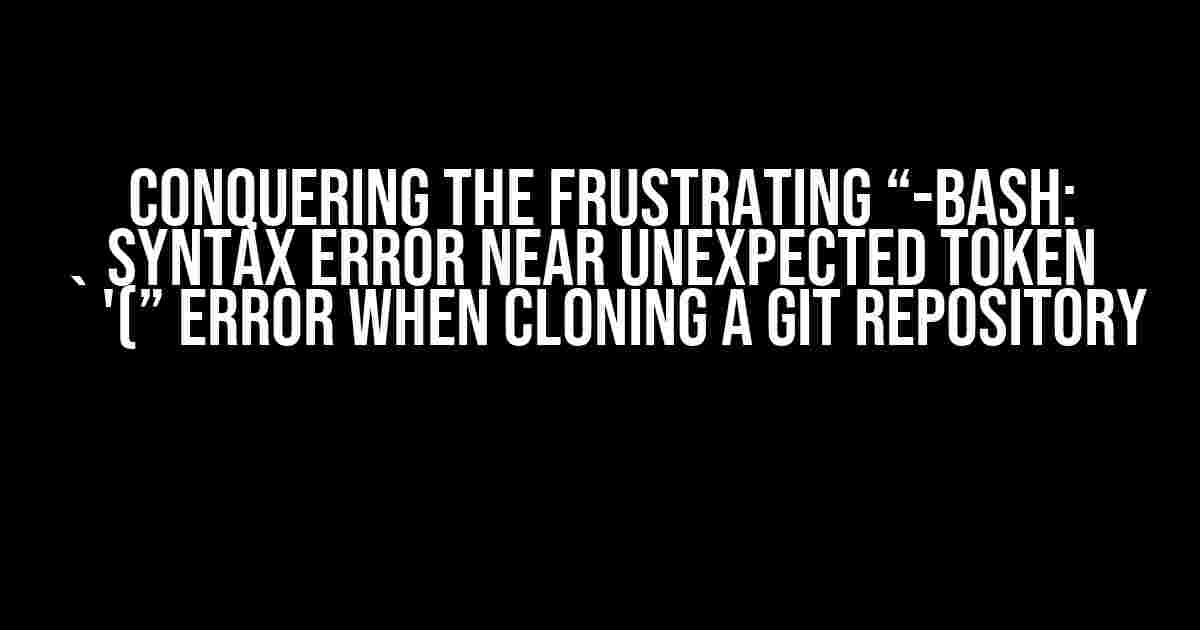Have you ever faced the infuriating “-bash: syntax error near unexpected token `(‘” error when trying to clone a Git repository? You’re not alone! This pesky error has baffled many a developer, leaving them scratching their heads and wondering what’s going on. Fear not, dear reader, for we’re about to embark on a journey to conquer this error once and for all!
What’s Causing the Error?
Before we dive into the solution, let’s take a step back and understand what’s causing this error in the first place. The “-bash: syntax error near unexpected token `(‘” error typically occurs when there’s an issue with the Git repository URL or the command used to clone it.
One common culprit is the presence of single quotes (‘) or parentheses () in the repository URL. Bash, the Unix shell used by Git, gets confused when it encounters these characters, leading to the syntax error.
Identifying the Problematic Character(s)
To identify the problematic character(s), let’s take a closer look at the Git repository URL. Open your terminal and type the following command:
git clone Replace
-bash: syntax error near unexpected token `('Solutions to the “-bash: syntax error near unexpected token `'(” Error
Solution 1: URL Encoding
One of the easiest ways to resolve this error is to URL-encode the problematic character(s) in the repository URL. You can do this by replacing the single quotes (‘) or parentheses () with their corresponding encoded values:
- Single quote (‘) → %27
- Left parenthesis (() → %28
- Right parenthesis ()) → %29
For example, if your repository URL is:
https://github.com/user/repo '(branch')Replace the single quotes with %27, like so:
https://github.com/user/repo%27branch%27Now, try cloning the repository again:
git clone https://github.com/user/repo%27branch%27Solution 2: Using Double Quotes
Another approach is to enclose the repository URL in double quotes (“) instead of single quotes (‘). This tells Bash to treat the entire URL as a single string:
git clone "https://github.com/user/repo '(branch)'"Note the double quotes around the URL. This should allow you to clone the repository without any issues.
Solution 3: Escaping the Problematic Characters
Our final solution involves escaping the problematic characters using a backslash (\). This tells Bash to treat the character literally, rather than interpreting it as a special character:
git clone https://github.com/user/repo '\(branch\)'By escaping the parentheses using a backslash (\), we’re telling Bash to treat them as literal characters, avoiding any syntax errors.
Additional Tips and Tricks
While we’ve covered the main solutions to the “-bash: syntax error near unexpected token `'(” error, here are some additional tips to keep in mind:
| TIP | DESCRIPTION |
|---|---|
| Use the correct Git repository URL | Double-check that you’re using the correct URL for the Git repository. A small typo can lead to the error. |
| Verify your shell version | Make sure you’re running the latest version of Bash. Older versions might have issues with certain characters. |
| Avoid using special characters in repository names | When creating a new Git repository, avoid using special characters like parentheses, single quotes, or other characters that might cause issues. |
Conclusion
There you have it, folks! With these three solutions and additional tips, you should be able to conquer the frustrating “-bash: syntax error near unexpected token `'(” error when cloning a Git repository. Remember to URL-encode problematic characters, use double quotes, or escape special characters to avoid any syntax errors.
Now, go forth and clone those repositories with confidence!
Happy coding!
Frequently Asked Question
Stuck with the dreaded “-bash: syntax error near unexpected token `(‘ error while cloning a Git repository? Worry not, dear developer! We’ve got the solutions to get you back on track.
What causes the “-bash: syntax error near unexpected token `(‘ error when cloning a Git repository?
This error typically occurs when there are special characters or single quotes in the Git repository URL. The single quote `(‘ is not interpreted correctly by the bash shell, leading to the syntax error. To resolve this, make sure to enclose the URL in double quotes or use an alternative syntax.
How can I fix the URL syntax to avoid the error?
To fix the URL syntax, simply surround the URL with double quotes instead of single quotes. For example, replace `git clone ‘https://example.com/repo.git’` with `git clone “https://example.com/repo.git”`. Alternatively, you can use the `git clone` command without quotes by separating the URL with spaces, like this: `git clone https://example.com/repo.git`.
Can I use escape characters to fix the URL syntax?
Yes, you can use escape characters to fix the URL syntax. For example, you can use a backslash (`\`) to escape the single quote, like this: `git clone \’https://example.com/repo.git\’`. This tells the bash shell to treat the single quote as a literal character instead of a special character.
Is there a way to configure Git to avoid this error in the future?
Yes, you can configure Git to avoid this error by setting the `core.sshCommand` variable. Run the command `git config –global core.sshCommand “ssh”` to set the default SSH command for Git. This will ensure that Git uses the correct syntax for cloning repositories.
What if I’m still experiencing issues after trying the above solutions?
If you’re still experiencing issues, try checking your Git version and update it if necessary. You can also try resetting your Git configuration by running `git config –global –unset-all`, then re-configure your Git settings. If the problem persists, it’s possible that there’s an issue with your repository or system configuration, so you may want to seek further assistance from a Git expert or system administrator.

